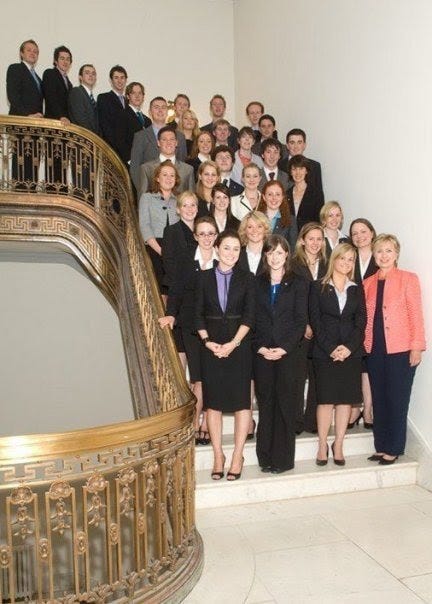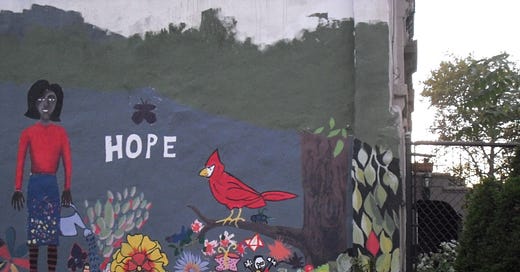Hope exists no matter who wins
Beautiful things grow out of shit (aka notes from me to you on election day)
Before we start, a quick re-introduction: I’m Clare Egan. I’m a queer Irish writer, on a mission to change how we think about life after trauma. I founded Beyond Survival in 2023 because I wanted a space for survivor-centred conversations about recovering after sexual violence. This community is rooted in supporting and empowering survivors to rebuild their lives. It’s my birthday this week, and the best gift you can give is to support my work.
This essay will be published on Election Day in the States, but I’m writing it days before. I’m writing it because I believe hope doesn’t depend on the outcome. I’m writing it as much to reassure myself as anyone else: American democracy may be on the edge of collapse, but I still have hope. And I think you should too.

This day eight years ago, I felt optimistic. Election Day landed on my birthday, and I’d made myself a cake. I went to bed early expecting to wake up to see Hillary Clinton become the first female American President. I’d met1 Clinton a few years before, and had long admired her fortitude and commitment to service. Her campaign for President was one of the only good things about 2016.
Back then, I was working for Amnesty International, a toxic organization that played a big role in the destruction of my mental wellbeing. I’d taken the job because I wanted to play a small role in dismantling Ireland’s regressive abortion laws. Since my first voluntary role in the nonprofit sector as a teenager, I’d been inspired by work that aimed to make our world a fairer place. That sounded good, but after more than a year of being on call 24/7 and trying to navigate Amnesty’s dysfunctional culture, my hope for mission-driven work was starting to disintegrate.
Then Trump won.
His election was one of the most visible triumphs for a known sexual predator.
Watching him felt like watching all the shitty men I’d ever had to find a way to survive. The men who harassed and assaulted me, and the ones who looked the other way, tacitly allowing it to happen. The Access Hollywood tapes were especially triggering. I’ll never forget the entitlement in Trump’s voice as he bragged about grabbing women by their genitals. Or how he over-enunciated the words “Locker room talk” as if he could ever make it OK.
At the time, I didn’t think I was really allowed to be impacted by it, even as someone who’d survived sexual trauma2. It felt silly to be hurt. Trump had already said so many horrible things. We knew he had assaulted dozens of women. He was about to go on trial for the rape of a 13 year old girl. But there was something different about hearing the jocularity in his voice, the brazenness of his depravity and how casually he completely erased women’s humanity. It felt viscerally familiar to me, and to many people who’ve experienced sexual violence.
Donald Trump’s election shocked me in a way I doubt I’ll ever experience again.3 It was worse than Covid or Brexit or anything else that shook the world as we knew it, because it confirmed my belief that people didn’t care about survivors. A few weeks after the Access Hollywood tapes were released, 62 million people voted for Trump. 62 million people were OK with having a President who bragged about sexual assault4. The fact that they chose a serial sexual predator over the first female candidate in history only deepened the wound.
It was as if American voters had said to every little girl that if she worked hard, she still couldn’t be president one day. But her abuser could.
Looking back, it’s impossible for me to separate the decimation of my personal sense of hope from what was unfolding in American politics. Walking to work the morning after the election, I felt hollow with despair. In the office, a male colleague tried to argue that Trump wasn’t really sexist. I put my headphones on. I tried not to cry.
I didn’t know it at the time, but a colleague would soon die by suicide, citing work pressure in the note he left for his family. This prompted an independent investigation which described Amnesty International as a “toxic working environment, with widespread bullying, public humiliation, discrimination and other abuses of power.” In the Irish office, a male colleague would later be convicted of sexual assault at a work event.
By the time I quit, burnt out and broken, I had very little hope left.
For six months, I was too traumatized to work. It’s a difficult chapter of my life to write about. To the outside world, it looked like a lot of bottomless sobbing and sitting around trying to numb my pain. But inwardly, I was building solid foundations for the life I have now. There is no single moment I can point to as exemplifying when my hope returned. Recovery is much too messy for that. But slowly, over months and years, a flicker of deeply rooted optimism began to crackle back to life.
It reminds me of the resilience of nature. Every Spring no matter how brutal the Winter, proud little flowers shoot through the earth’s surface. They don't know if they'll bloom or get snuffed out by one last frost, but they're wired to try.
Sometimes, hopelessness is rational. This is especially true among survivors of sexual violence. We often have to try to rebuild our lives without adequate support, while the perpetrators face little-to-no repercussions.
I’m suspicious of those who traffic in unearned hope, who insult suffering people by saying that they ought to be more optimistic. Blind, naive hope is never useful. Often, it’s dismissive of deep pain. I’ve known people who are so relentless in their baseless hope that it becomes almost delusional. That is never helpful. Ignorance dressed up as hope is as destructive as denial.
While unearned hope is poisonous, true hope can save us.
True hope is rooted in what might someday be possible. It is imaginative. It allows us to envisage something that isn’t yet real. It allows us to keep going, even if we’re not sure there’s something better out there. I sometimes feel overcome with this urge to find every survivor I can and tell them: YOU CAN SURVIVE THIS. IT IS POSSIBLE. That impulse springs from the shock of having made it through something that I long thought was unsurvivable.
But the truth is that recovery is not a given. There is no guarantee. I worry that my perspective is rooted in survivor bias. I was able to rebuild my life because I had the time, space and resources to. Not everybody gets that. Not everyone survives. Individual resilience is not enough in our broken, racist, misogynistic, hateful world.
I still feel that powerful human urge to keep going. To keep living and trying and failing and trying again. It’s the life force that propels us all away from death and toward the future, no matter how painful the present might be. Often, when I had no hope, I borrowed it from other people. I read Rebecca Solnit’s inspiring book. I sank into the rhythmic salve of this poem. I listened to Ta-Nehisi Coates complicate the expectation that he, a Black author, should have to provide hope to a predominantly white audience.
These days, I am careful with my hope. I don’t treat it recklessly, and I certainly don’t let it get entangled with electoral politics. The Irish writer
wrote about hope in her book Thin Places:"The Irish for 'to hope' is, too, the Irish for 'to burn'. Embers, holding on for dear life, held tight inside the hearth's womb, waiting to be rekindled"
I believe in a tough-minded, muscular hope that rejects naivety or simple answers. I believe in hope as fuel, hope as “an axe you break down doors with in an emergency5”.
This is the kind of hope I hold now. The kind that reminds you that beautiful things grow out of shit. Whatever happens over the next few days, the world goes on. And we will find a way to go on with it.
💕 If this piece resonated with you, please tap the heart below to help spread the word.
💬 In the comments, I’d love to hear your perspectives on hope. Is it a necessary concept, or a problematic one? Election anxiety is also welcome in the comments. I’m probably gonna be spiraling for the rest of the week, so it’d be nice to have some company 😉
🎁It’s my birthday on Friday. If my work makes you think differently or feel less alone, a paid subscription is truly the best gift I could receive.
If you enjoyed this piece, you might also like:
"Met" is a strong word. I was in the same space as her, and we took a group photo.
Sexual violence is where Trump’s monstrousness intersects with my own private pain and trauma. For others, it’s his racism, his bigotry, his xenophobia, or something else from his long list of despicable behavior. It’s worth remembering that he’d called Mexicans rapists, mocked a disabled journalist, promised to “ban Muslims” and countless other things before the Access Hollywood tape which rightly got a lot of attention. But it’s worth noting that Trump threatening a white woman generated a furore while his disgraceful behavior towards other groups did not.
It was, of course, a privilege to be shocked. Many people knew to expect less from the American political system than I did.
Two-thirds of white women voted for Trump. Statistics tell us that a large majority of them have also been victims of sexual violence. As my devastation subsided, I began to wonder about those women. What must it be like to live in a world where voting for an abuser felt like the better choice? Contrast that with the 97% of black women who voted for Hillary Clinton, a statistic that’s particularly striking given the devastating impact of Bill Clinton’s 1995 Crime Bill on black communities across America.
To quote Rebecca Solnit's wonderful book Hope in the Dark.








